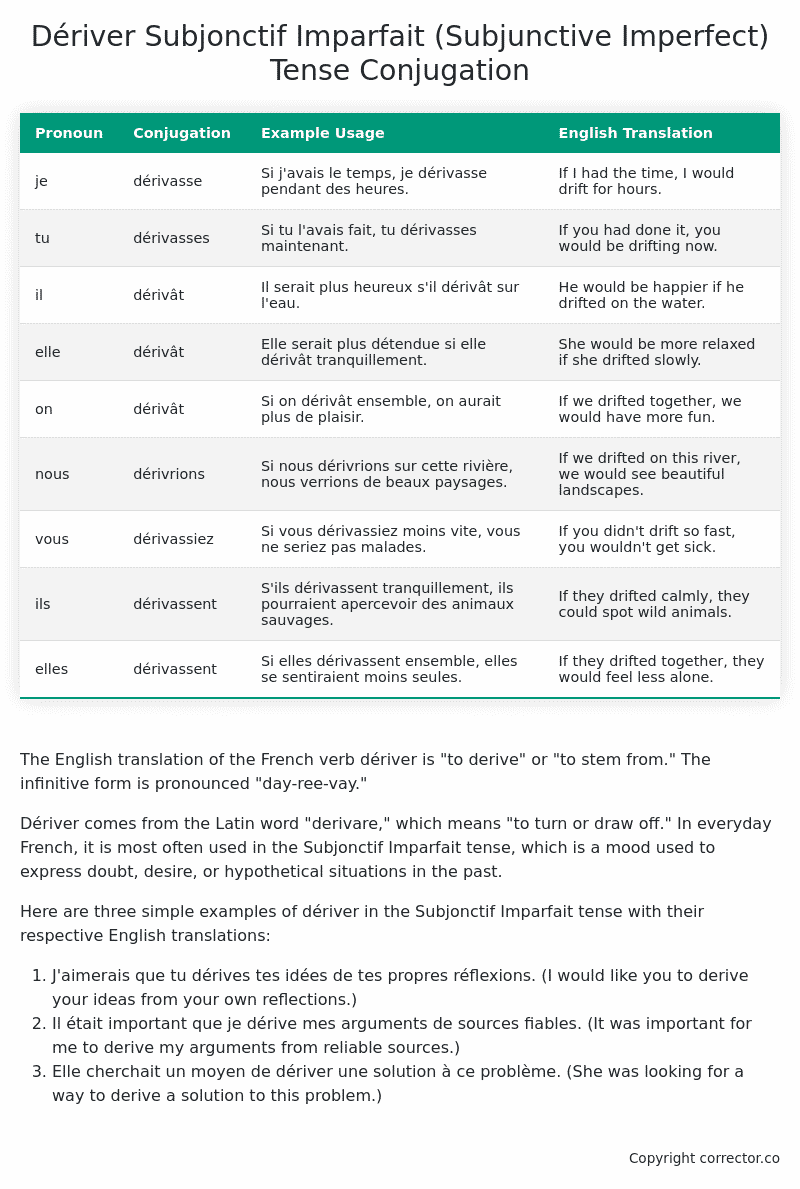Subjonctif Imparfait (Subjunctive Imperfect) Tense Conjugation of the French Verb dériver
Introduction to the verb dériver
The English translation of the French verb dériver is “to derive” or “to stem from.” The infinitive form is pronounced “day-ree-vay.”
Dériver comes from the Latin word “derivare,” which means “to turn or draw off.” In everyday French, it is most often used in the Subjonctif Imparfait tense, which is a mood used to express doubt, desire, or hypothetical situations in the past.
Here are three simple examples of dériver in the Subjonctif Imparfait tense with their respective English translations:
- J’aimerais que tu dérives tes idées de tes propres réflexions. (I would like you to derive your ideas from your own reflections.)
- Il était important que je dérive mes arguments de sources fiables. (It was important for me to derive my arguments from reliable sources.)
- Elle cherchait un moyen de dériver une solution à ce problème. (She was looking for a way to derive a solution to this problem.)
Table of the Subjonctif Imparfait (Subjunctive Imperfect) Tense Conjugation of dériver
| Pronoun | Conjugation | Example Usage | English Translation |
|---|---|---|---|
| je | dérivasse | Si j’avais le temps, je dérivasse pendant des heures. | If I had the time, I would drift for hours. |
| tu | dérivasses | Si tu l’avais fait, tu dérivasses maintenant. | If you had done it, you would be drifting now. |
| il | dérivât | Il serait plus heureux s’il dérivât sur l’eau. | He would be happier if he drifted on the water. |
| elle | dérivât | Elle serait plus détendue si elle dérivât tranquillement. | She would be more relaxed if she drifted slowly. |
| on | dérivât | Si on dérivât ensemble, on aurait plus de plaisir. | If we drifted together, we would have more fun. |
| nous | dérivrions | Si nous dérivrions sur cette rivière, nous verrions de beaux paysages. | If we drifted on this river, we would see beautiful landscapes. |
| vous | dérivassiez | Si vous dérivassiez moins vite, vous ne seriez pas malades. | If you didn’t drift so fast, you wouldn’t get sick. |
| ils | dérivassent | S’ils dérivassent tranquillement, ils pourraient apercevoir des animaux sauvages. | If they drifted calmly, they could spot wild animals. |
| elles | dérivassent | Si elles dérivassent ensemble, elles se sentiraient moins seules. | If they drifted together, they would feel less alone. |
Other Conjugations for Dériver.
Le Present (Present Tense) Conjugation of the French Verb dériver
Imparfait (Imperfect) Tense Conjugation of the French Verb dériver
Passé Simple (Simple Past) Tense Conjugation of the French Verb dériver
Passé Composé (Present Perfect) Tense Conjugation of the French Verb dériver
Futur Simple (Simple Future) Tense Conjugation of the French Verb dériver
Futur Proche (Near Future) Tense Conjugation of the French Verb dériver
Plus-que-parfait (Pluperfect) Tense Conjugation of the French Verb dériver
Passé Antérieur (Past Anterior) Tense Conjugation of the French Verb dériver
Futur Antérieur (Future Anterior) Tense Conjugation of the French Verb dériver
Subjonctif Présent (Subjunctive Present) Tense Conjugation of the French Verb dériver
Subjonctif Passé (Subjunctive Past) Tense Conjugation of the French Verb dériver
Subjonctif Imparfait (Subjunctive Imperfect) Tense Conjugation of the French Verb dériver (this article)
Subjonctif Plus-que-parfait (Subjunctive Pluperfect) Tense Conjugation of the French Verb dériver
Conditionnel Présent (Conditional Present) Tense Conjugation of the French Verb dériver
Conditionnel Passé (Conditional Past) Tense Conjugation of the French Verb dériver
L’impératif Présent (Imperative Present) Tense Conjugation of the French Verb dériver
L’infinitif Présent (Infinitive Present) Tense Conjugation of the French Verb dériver
Struggling with French verbs or the language in general? Why not use our free French Grammar Checker – no registration required!
Get a FREE Download Study Sheet of this Conjugation 🔥
Simply right click the image below, click “save image” and get your free reference for the dériver Subjonctif Imparfait tense conjugation!

Dériver – About the French Subjonctif Imparfait (Subjunctive Imperfect) Tense
Formation
Common Everyday Usage Patterns
Interactions with Other Tenses
Subjonctif Présent
Indicatif Passé Composé
Conditional
Conditional Perfect
Summary
I hope you enjoyed this article on the verb dériver. Still in a learning mood? Check out another TOTALLY random French verb conjugation!


